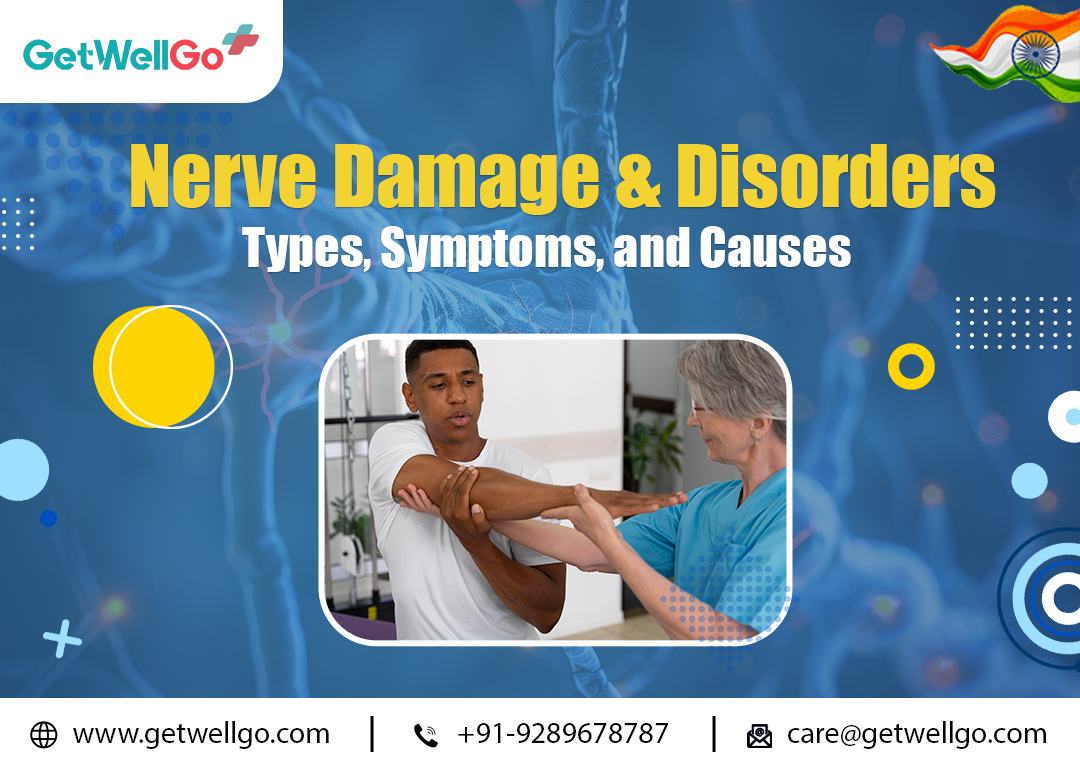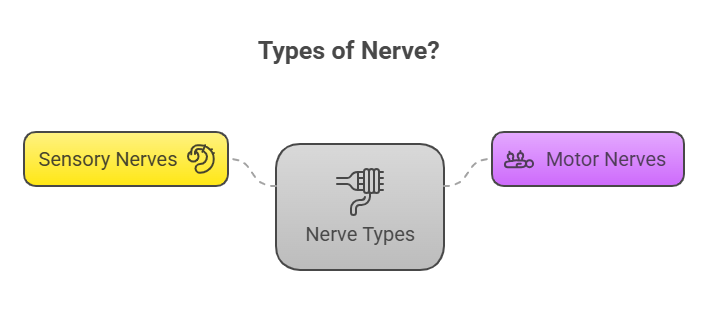Nerve Damage & Disorders - Types, Symptoms, and Causes
Nerve damage explained: types, causes, and symptoms you shouldn't ignore. Get expert health insights to stay informed with GetWellGo’s helpful resources.

-
Category
General -
Published By
GetWellGo Team -
Updated on
09-Apr-2025
What is Nerve?
A nerve is a group of fibers (axons) that transmit electrical signals between the brain, spinal cord, and the rest of the body. Nerves control movement, sensation, and numerous automatic body functions.
Nerve Damage & Pain
Nerve damage (also referred to as neuropathy) occurs when nerves are damaged and are unable to transmit messages between the brain and the body effectively.
Causes of Nerve Damage include:
- Diabetes (extremely common)
- Injuries (such as cuts, accidents, or surgery)
- Infections
- Vitamin deficiencies (particularly B vitamins)
- Autoimmune diseases (such as lupus)
- Certain medications (such as chemotherapy drugs)
Nerve pain (referred to as neuropathic pain) is different from normal pain such as a cut or a bruise.
It's usually characterized as:
- Burning
- Tingling
- Shooting pain (such as electric shocks)
- Stabbing or sharp pain
- Numbness with pain
- Pins and needles sensation
What are Nerve Damage Symptoms?
General Nerve Damage Symptoms
- Numbness: No feeling in hands, feet, arms, or legs
- Tingling: "Pins and needles" sensation (like when your leg goes to sleep)
- Burning Pain: Hot, stinging, or burning sensation
- Sharp, Shooting Pain: Electric shock-like
- Sensitivity to Touch: Even light touch (such as clothes) hurts
- Muscle Weakness: Difficulty holding objects, walking, or moving normally
- Muscle Twitching or Cramping: Muscles contract or move without you wanting them to
- Balance Problems: Being unsteady or falling without difficulty
- Paralysis: In severe cases, total loss of movement in a region
- Changes in Skin, Hair, or Nails: Thinning of the skin, loss of hair, or brittle nails in the affected region
- Sweating Too Much or Too Little: Since nerve damage can interfere with automatic body processes
What are types of Nerve?

Sensory Nerve
Sensory nerves are special nerves which bring messages from your body to your brain.
They allow you to feel what is happening around you — such as:
- Touch
- Temperature (hot or cold)
- Pain
- Pressure
- Vibration
- Position (where your body parts are without needing to look)
How Sensory Nerves Function
- You're touching something (such as a warm cup).
- Tiny sensors (receptors) in your skin become activated.
- The sensory nerve receives the signal.
- It sends a message to your brain very quickly.
- Your brain responds with, "Whoa! That's hot!" and you respond.
What if Sensory Nerves Get Damaged?
- If sensory nerves get damaged, you may feel:
- Numbness (unable to feel touch properly)
- Tingling (pins and needles sensation)
- Burning Pain (particularly at night)
- Extreme Sensitivity (light touches hurt excessively)
- Loss of Balance (because you can't feel your feet well)
They are common for:
- Diabetes (diabetic neuropathy)
- Injuries
- Infections
- Vitamin B12 deficiency
Example of a Sensory Nerve
The Median Nerve in your arm is partly a sensory nerve.
Motor Nerves
Motor nerves are the nerves that transmit messages from your spinal cord and brain to your muscles.
They make all your movements — such as walking, talking, blinking, and even smiling!
How Motor Nerves Work
- You decide to move (such as raising your arm).
- Your brain sends an electrical signal via motor nerves.
- The motor nerves instruct your muscles to contract and move.
- Boom — you raise your arm!
What Happens if Motor Nerves are Damaged?
- If motor nerves get damaged, you may have:
- Muscle weakness (can't move muscles correctly)
- Muscle twitching (small jerking movements)
- Muscle cramps or spasms
- Muscle shrinking (referred to as atrophy)
- Paralysis (severe cases — can't move a part of your body)
Common reasons for motor nerve damage:
- Injuries (such as a cut or crush injury)
- Diseases (such as ALS — Amyotrophic Lateral Sclerosis)
- Autoimmune attacks (such as in Guillain-Barré syndrome)
- Nerve compression (such as in slipped disc)
Example of a Motor Nerve
The Sciatic Nerve is the largest nerve in your body — it innervates muscles in the back of your thigh, lower leg, and foot.
Autonomic Nerves
Autonomic nerves regulate the automatic processes of your body — things you don't consciously think about.
They regulate:
- Heartbeat
- Breathing
- Blood pressure
- Digestion
- Sweating
- Body temperature
- Bladder and bowel control
How Autonomic Nerves Function
The autonomic system consists of two components:
- Sympathetic: "Fight or flight" system (makes body ready to act)
- Parasympathetic: "Rest and digest" system (sights body to relax)
What Occurs if Autonomic Nerves are Affected?
If autonomic nerves are affected, you can have:
- Dizziness or fainting (sudden drop in blood pressure)
- Abnormal heart rate (too fast or too slow)
- Digestive difficulties (bloating, diarrhea, constipation)
- Bladder issues (difficult to control peeing)
- Sweating issues (too little or too much)
- Heat intolerance (can't tolerate hot weather)
- Sexual issues (such as erectile dysfunction)
Common reasons include:
- Diabetes (autonomic neuropathy)
- Autoimmune disorders
- Nerve damage
- Infections
- Certain medications
The Vagus Nerve is a large autonomic nerve.
It regulates such things as:
- Heartbeat
- Breathing
- Digestion
- Speaking
If the vagus nerve is injured or inflamed, it can lead to serious issues such as fainting or digestive trouble.
Nerve Damage Treatment
Treatment varies depending on how severe the damage is and what caused it.
The objectives are typically:
- Alleviate pain
- Heal nerves
- Guard against further damage
Treatment Plan:
- Treat the Underlying Cause
- Medications
- Physical therapy
- Lifestyle Changes
- Supplements
- Surgery
Nerve Damage Surgery
- Nerve Decompression: Relaxes pressure on the nerve
- Nerve Repair: Joins the ends of an injured nerve back together
- Nerve Grafting: Replaces an injured nerve with a healthy segment from elsewhere
- Nerve Transfer: Transplants a functioning nerve to assume the function of an injured nerve
- Tumor Removal: Eliminates tumors that compress nerves
Top Doctor for Nerve Damage
- Dr. Sumit Singh, Chief Neurology at Artemis Hospital, Gurgaon
- Dr. Arun Garg, Chairman of Neurosciences at Medanta-The Medicity, Gurgaon
- Dr. Praveen Gupta, Principal Director and Chief of Neurology at Fortis Memorial Research Institute, Gurgaon
- Dr. Mohit Goel, Director Neurosciences at Max Hospital, Saket
Best Hopsital for Nerve Damage Treatment
- Artemis Hospital, Gurgaon
- Medanta-The Medicity, Gurgaon
- Fortis Memorial Research Institute, Gurgaon
- Max Hospital, Saket
Peripheral Nerve Injury
Peripheral nerves are the nerves outside the brain and spinal cord.
They link your brain and spine to your:
- Hands
- Arms
- Feet
- Legs
- Organs
Peripheral nerve injury means these nerves get damaged — and that can mess with how you feel and move.
Causes of Peripheral Nerve Injury
It may occur due to:
- Cuts or wounds (such as deep stab injuries)
- Pressure (such as prolonged sitting, carpal tunnel)
- Stretching injuries (accidents, sports injuries)
- Burns (thermal or chemical)
- Crushing injuries (car accidents, falls)
- Medical conditions (diabetes, infections)
Symptoms of Nerve Damage in Leg
- Numbness
- Tingling
- Burning Pain
- Weakness
- Muscle Twitching
- Loss of Balance
- Cold Feeling
- Sensitivity
- Foot Drop
- Muscle Wasting
Nerve Damage Causes
- Injuries and Accidents
- Diabetes
- Infections
- Autoimmune Diseases
- Pressure on Nerves
- Tumors
- Vitamin Deficiencies
- Alcoholism
- Medications and Toxins
- Genetic Disorders
- Kidney and Liver Diseases
- Chronic Inflammation
Why Choose GetWellGo for Nerve Damage & Disorders?
GetWellGo is regarded as a leading supplier of healthcare services. We help our foreign clients choose the best treatment locations that suit their needs both financially and medically.
We offer:
- Complete transparency
- Fair costs.
- 24 hour availability.
- Medical E-visas
- Online consultation from recognized Indian experts.
- Assistance in selecting India's top hospitals for nerve damage & disorder.
- Expert neurologist & Neurosurgeon with a strong track record of success
- Assistance during and after the course of treatment.
- Language Support
- Travel and Accommodation Services
- Case manager assigned to every patient to provide seamless support in and out of the hospital like appointment booking
- Local SIM Cards
- Currency Exchange
- Arranging Patient’s local food
Contact Us Now!
Fill the form below to get in touch with our experts.
